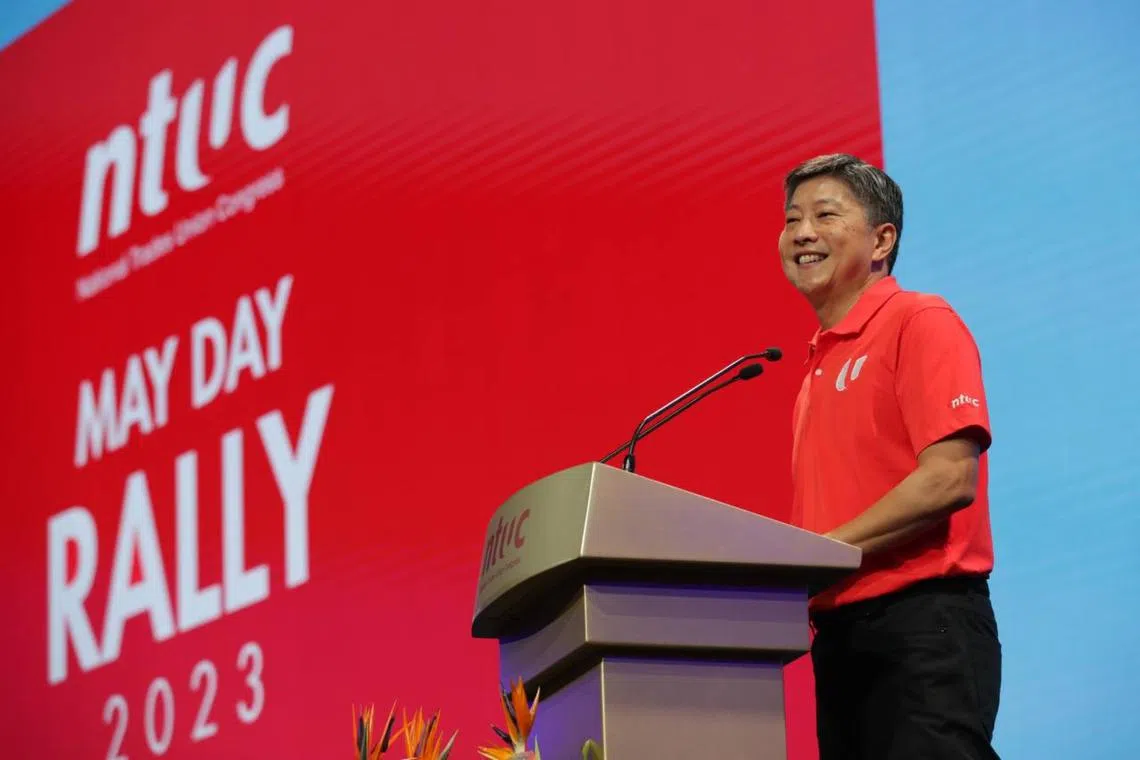May Day Rally 2023
NTUC must ‘do more and do better’ for PMEs and youth: Ng Chee Meng
Sign up now: Get ST's newsletters delivered to your inbox

NTUC Secretary-General Ng Chee Meng delivering his speech at the May Day Rally 2023 at Suntec Singapore Convention and Exhibition Centre.
ST PHOTO: GIN TAY
SINGAPORE – The National Trades Union Congress (NTUC) must “do more and do better” for professionals, managers and executives (PMEs), as well as for youth, while building on current efforts to improve workers’ wages and welfare.
These are two segments the labour movement has underserved, even as it makes inroads with championing vulnerable workers and moderating the cost of living, labour chief Ng Chee Meng said in his May Day Rally speech on Monday.
The push to get 12,000 human resources practitioners certified to comply with fair employment practices is one part of the effort to close the gap for PMEs, Mr Ng said at the rally held at the Suntec Singapore Convention & Exhibition Centre.
“However, in the youth segment, NTUC recognises that we can do more to serve our youth better,” said Mr Ng.
To this end, the labour movement launched a youth task force a year ago, which has engaged 10,000 young people to find out their key concerns.
Feedback from youth on their desire for quality internships and mentorships led NTUC to develop the Career Starter Lab with employers, he noted.
This is a pilot scheme to let young people try out a job after school and national service,
The moves to court youth and PMEs are part of a wider revamp of the labour movement’s business, membership and training models over the last four years to keep up with changes in worker demographics and the economy.
Changes to its business model include working with freelancers, launching a new partnership model with small and medium-sized enterprises, and introducing an associate membership programme for migrant workers, said Mr Ng.
As for training, the labour movement has set up a training and transformation group. It has also adopted an integrated approach, tying together its continuing education and training provider arm NTUC LearningHub, the Ong Teng Cheong Labour Leadership Institute and the Employment and Employability Institute, he said.
Mr Ng said NTUC’s successful foray into digital banking via Trust Bank,
The changes have paid dividends in NTUC’s membership, which has grown from 980,000 in 2019 to 1.12 million currently, noted Mr Ng.
Driving this growth were new membership benefits catering to members’ needs and aspirations across life stages, as well as a revamped digital presence through its website, chatbots and the MyNTUC app, he said.
“Our 1.5 million goal by 2030 is not so distant a number any more,” he said, referring to a membership target the labour movement set for itself in 2019.
Mr Ng said NTUC champions the interests of lower-wage, platform and mature workers, yet maintains industrial peace and adds value for its employer partners. This is in contrast to other parts of the world, where unions and workers go on strike to show their unhappiness.
“(Such a) combative, confrontational approach leads to lose-lose outcomes, even if the intent was a good one,” he said.
Instead, the labour movement helped expand the Progressive Wage Model
It also pushed for increased protection for platform workers, and higher retirement and re-employment ages for mature workers, among other moves. These were done in collaboration with the Government and employers in a three-way, or tripartite, partnership, he said.
Summing up, Mr Ng said that to keep pace with the evolving needs and aspirations of workers, the labour movement will need to build an innovative culture and decisively implement the new business strategies it develops.
He added: “Should we fail, fail fast, and learn fast, in practice… Then we go out again, try again, and move towards success.”


